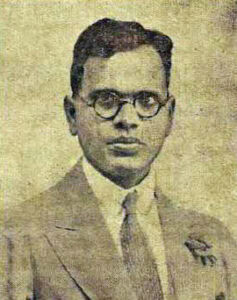Growing up in Tamilmanam meant an upbringing steeped in memory. Everywhere around me were letters addressed to my great-grandfather: people requesting his Tamil Thirumanam book or En Varalaru. These weren’t just letters, but the lives touched by his work. My curiosity, stirred by these appeals, led me to my grandfather’s diary – a hidden trove of recollections, dates, book titles, correspondences.
This year, on what would have been his 125th birth anniversary, I find that the journey of rediscovery still continues. Even as these words are written, a new mail arrives requesting his book to help with a Tamil wedding; a wedding invitation and another book addressed to him rest quietly beside me. His work is living, breathing in people’s lives, ceremonies, in the very fabric of community.
The Life and Contributions of K. Ramalinganar
 K. Ramalinganar was born in 1899 in Keelacheri. His education led him to Zion School (Chindadripet), Wesley College, and later Pachaiyappa’s College, where he completed his Bachelor of Arts degree. During his formative years, he came under the influence of notable Tamil scholars and thinkers, which shaped his sense of language, culture, and public duty.
K. Ramalinganar was born in 1899 in Keelacheri. His education led him to Zion School (Chindadripet), Wesley College, and later Pachaiyappa’s College, where he completed his Bachelor of Arts degree. During his formative years, he came under the influence of notable Tamil scholars and thinkers, which shaped his sense of language, culture, and public duty.
He entered public service, serving in various capacities: as a Senior Writer, Registrar, Municipal Commissioner, College Principal, and Labour Welfare Officer. Alongside his administrative work, his passion was ensuring that Tamil was not just preserved as a poetic or devotional language, but used formally: in administration, law, education.
One of his earliest efforts was compiling Aatchi Sol Agarathi (‘Administrative Words’ – a list of Tamil administrative / governance vocabulary), published in the 1940s. Over time, he produced a number of works designed to make procedures, laws, and official functions intelligible in Tamil, not in a borrowed or translated sense, but as a language with its own structure, dignity, capability.
His work was in various levels, ensuring Tamil was used in district administration, forestry, official correspondence, courts, education – for which people came to call him Aatchimozhik Kaavalvar – the Guardian of the Administrative Language.
His Books and Writings
From what is known, K. Ramalinganar wrote around 17 books across many decades. Some of the titles and their themes include:
Isai Chakravarthi Naina Pillai Varalaaru — a biography of a music maestro
Nagaraatchi Murai — guidance for how municipal administration can use Tamil
Thiruvembavai — a devotional commentary
Tamil Aatchi Solgal — Tamil administrative terminology
Aatchiththurai Tamil — a compendium or resource of administrative terms in Tamil
Aatchi Sol Akarathi — a dictionary/glossary of terms for official use
Tozhilalar Sattath Thoguppu — translation of the Labour Code into Tamil
Tamil Thirumanam — a guide explaining Tamil marriage customs and procedures
En Varalaru
These works reflect both the functional and cultural side of his mission: to equip people with knowledge in Tamil (law, customs, governance) and to root identity in language
Reflections on 125 Years and Personal Connection
This 125th birth anniversary is more than a date – it’s a reminder of how work done decades ago still resonates. The books he wrote are still requested; cultural rituals still refer to Tamil Thirumanam, people still ask for En Varalaru. The invitations, the letters – in essence, the legacy – is alive. It’s strengthened for me not just by reading his public works, but by entering the private archive: my grandfather’s diary, the letters written to him.
I was asked last week in a family event, was that your thatha who coined the words,
Bus — perundhu
Car — maghizundhu
Conductor — nadathunar
Governor — alunar
And many more
And I said yes, it is and then I was back thinking about what made him choose that path, amidst lots of responsibilities and difficulties.